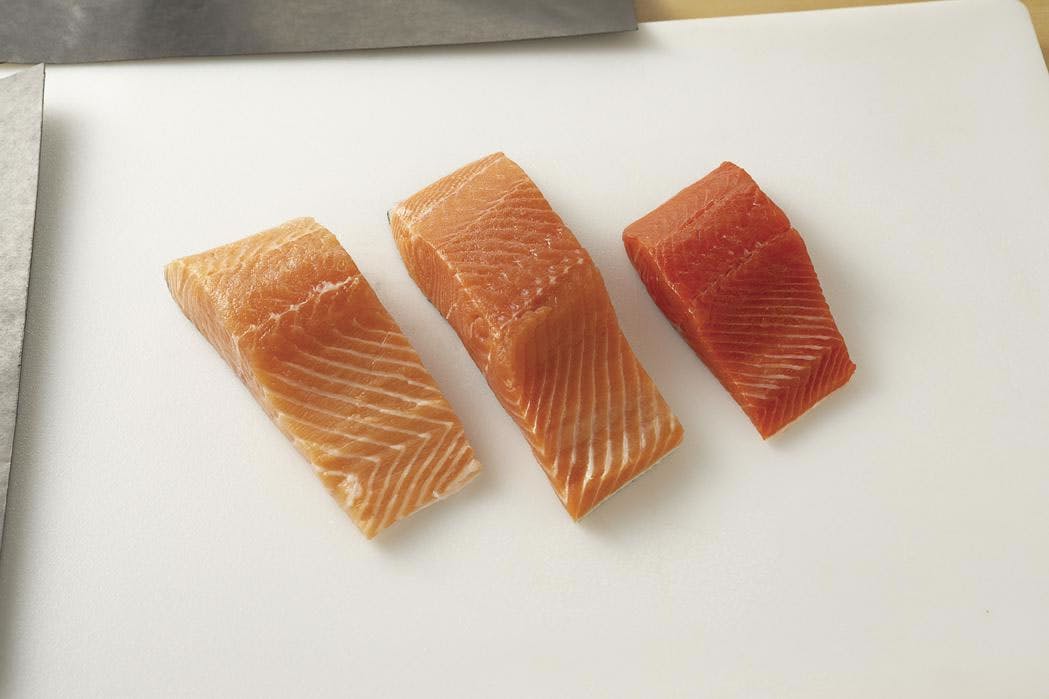Wild-caught fish are often healthier with less contamination from man-made toxins because they feed on a natural diet of smaller fish and algae and come into contact with less bacteria and parasites. Cons of Wild-Caught Fish.
 Farm Raised Vs Wild Salmon Fish
Farm Raised Vs Wild Salmon Fish
Further the answer will change over time as some fish stocks replenish fishing equipment is re-designed to catch fish with less damage and our data about fish populations get better.
Farmed fish vs wild. The wild fish gets a healthier menu. If playback doesnt begin shortly try restarting your device. Fish in the wild eat a natural diet and tend to be slightly lower in saturated fat than farm-raised varieties.
The bottom line. Videos you watch may be added to the TVs watch history and influence TV recommendations. Farmed fish can be slightly higher in omega-3 fatty acids presumably due to the farms fortified feed.
Wild fish tends to be a bit higher in Omega-3 acids because wild caught fish eat a diet that lends itself to higher Omega-3 concentration ie. Consider this your cheat sheet to the most sustainable fish and seafood options out there. Fish just do not grow as fast in a pen as they do in the wild.
Due to the high density of fish in aquaculture farmed fish is generally more susceptible to infections and disease than wild fish. Wild vs farmed fish. Farm-raised fish tend to have higher fat content since wild fish get more exercise and because farmed fish are typically given feed high in fat from sources such as fish oil.
To counter this problem antibiotics are frequently added to fish. Some studies have shown how farm-raised varieties can be higher in contaminants. Wild fish on the other hand are bursting with trace minerals found in the oceans.
When it comes to farmed fish vs wild fish the choice isnt quite as simple as it seems. Because wild fish swim freely and eat a natural diet they have less saturated fat than farmed fish. The downside is that many larger wild fish are high in mercury and poor fishing methods can harm the ocean habitat and result in overfishing.
As far as shellfish are concerned the nutritional difference between say farmed scallops and wild is minimal. The issue with proving if wild-caught fish is healthier than farmed fish lies within the complexities and variabilities of the specific fish consumed. We explain the differences in how these are sourced as well as the impacts on people and the planet.
Because PCB polychlorinated biphenyl which is one type of POP levels are five to 10 times higher in farmed fish than in wild fish. The difference between farmed and wild seafood When we buy seafood its either farmed or wild. The climate is changing and the seafood industry is adjusting with it.
That includes healthy fats such as omega-3 fatty acids as well as saturated fat. Additionally farm-raised fish tend to have a higher instance of disease due to farming conditions. Whether youre buying salmon trout shrimp or any other kind of seafood make sure it is wild.
Farm-raised fish have more omegas than fish raised in the wild due to their higher fat content. Wild fish are better for you and for our planet. They each have their pros and cons and there are other factors to consider including specific fishing and farming methods and sources of origin.
Farm-raised fish vs. Farmed fish have more fat but less Omega-3s are contaminated with PCBs antibiotics and other contaminants and fish farming has serious environmental consequences. Wild-caught fish may be more nutritious and support a more localized economy but farmed fish provides a stable supply for a.
It depends on many variables ranging from the particular type of fish you want to the type of fishing gear used. At this time there is no simple answer to the wild vs. And the farm fishs food is chosen by the farmer instead of the fish and it is unlikely that the fish farmer will buy expensive DHA-enriched fish food.
Wild-Caught Versus Sustainably-Farmed Fish When surveyed the majority of individuals believe that wild caught fish is healthier tastes better and is safer for consumption than farmed fish 1. What should you choose. Wild-caught fish are not exposed to pesticides to treat sea lice and other parasites.
Wild-caught which is better. Farmed fishing may be beneficial because it can take pressure off over-fished areas and allow depleted wild fish populations to return. Wild-caught fish live in open oceans rivers and lakes so water quality is crucial to the heath of the fish.
Keep a goldfish in a bowl and it stays a tiny goldfish. Unfortunately the answer is not so simple. However the fish farming industry has found ways to introduce more good Omegas into the farmed fish diet by cultivating algae and worms for food.
Farmed fish such as salmon can be as high or higher in omega-3 fatty acids than their wild cousins because their feed is composed of plants grains and fishmeal which contains omega-3s and makes them fattier.